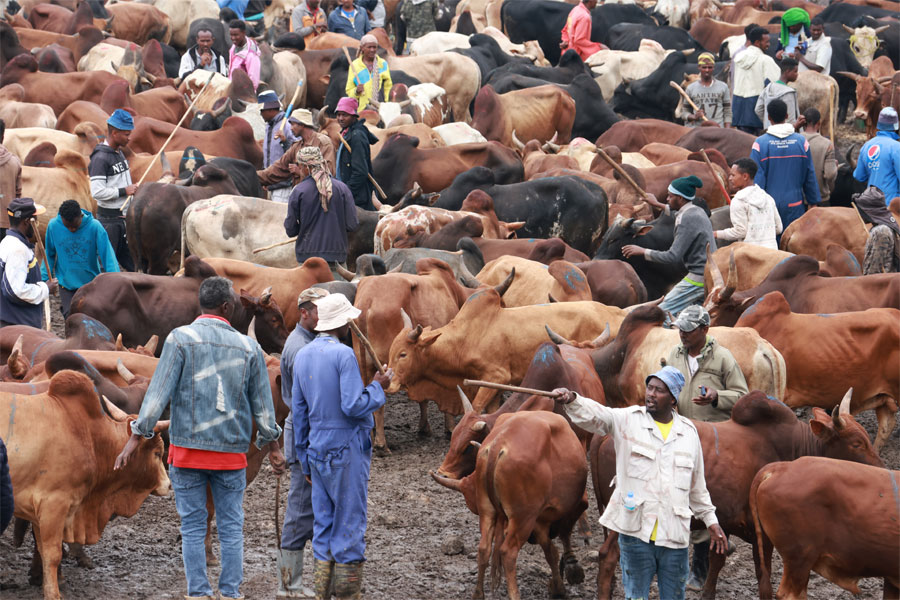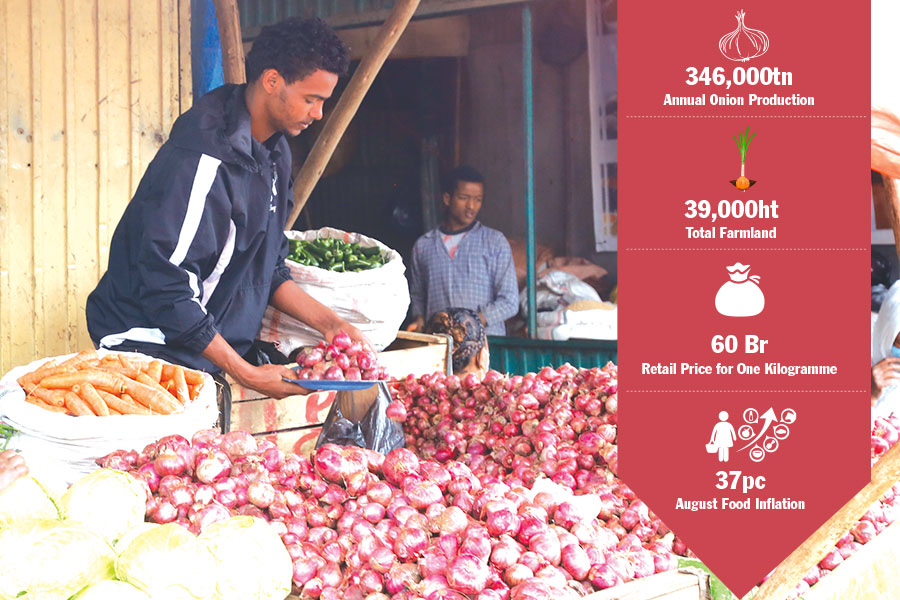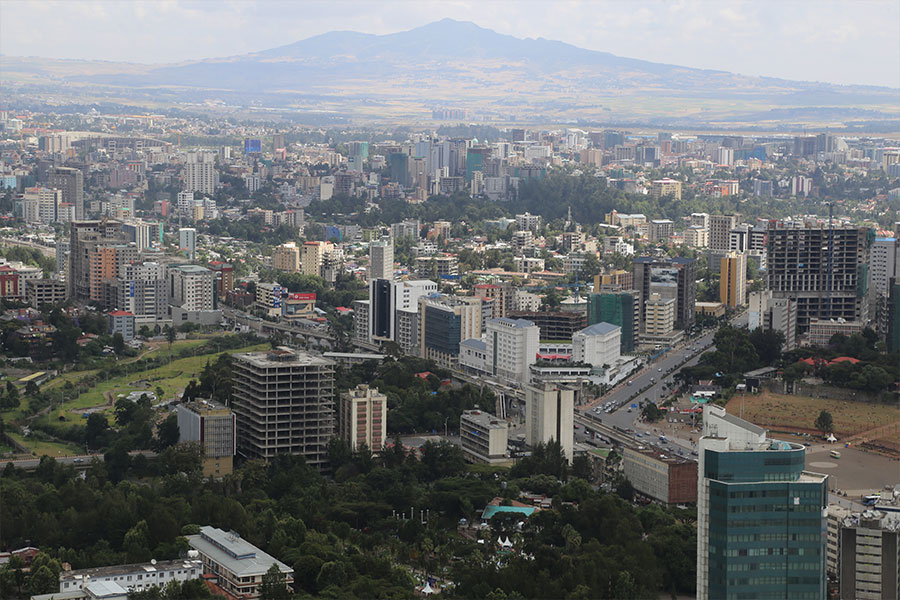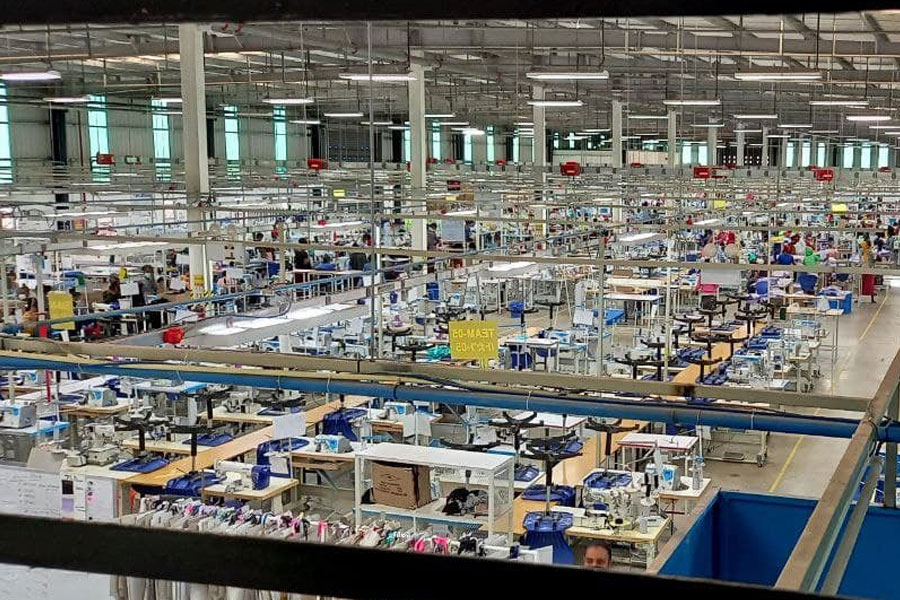
News Analysis | Dec 09,2023
The narrow streets of Shola, one of the largest trading hubs in Addis Abeba, were crowded with shoppers. Packed with hundreds, if not thousands, of traders selling food and non-food items, the market near the Megenagna area was already buzzing. It was a testament that the holiday vibe remains unflinching even amid the highest inflation rates the country has seen in over a decade. The markets were upbeat last week.
Although it was still morning, Shola’s chicken vendors were busy last Thursday, a few days before the New Year. This market section was alive with the sound of haggling and chickens clucking. It was stocked mostly with domestic breeds. Chickens from Wellega in Oromia and Welayta in the Southwestern regional states fetch the highest prices at 900 Br a head. It was 40pc higher than what Almaz Hailu, a public service employee in her early 30s, paid a year ago.
The mother of two made her way to Shola from her home in the Samit neighbourhood, a few kilometres away. She has been making the trip for years, looking to buy goods and ingredients for the holiday feast she prepares for her family. Poultry was priority number one on her shopping list. This time around, her younger sister accompanied Almaz to the market.
The sisters were taken aback by the price tag. They could not comprehend that a chicken that would have sold for less than 100 Br barely a decade ago now costs 10 times more.
But, buyers like Almaz have no choice but to accept the vagaries of the market. Many households were compelled to do away with long-held traditions and customs as a trade-off for the skyrocketing cost of living.
After roaming the market for half an hour, Almaz and her sister decided to buy mid-sized chickens for 1,500 Br.
“I can’t believe I’ve to spend a quarter of my budget on this shopping trip,” Almaz told Fortune.
On the other end was Sentayehu Seifu, trading chickens for over a decade. He brings them here from farmers in Oromia’s Wellega and North Shewa zones, hoping to have a 100 Br margin on each one. He was busy last week, pulling a red-feathered fowl from their coops and showcasing them to interested buyers like Almaz.
“The market is starting to pick up,” said Sentayehu.
He had sold seven before Almaz arrived.
Sentayehu provides slaughtering and plucking services for an extra 50 Br. Some of his buyers, including Almaz, would rather not slaughter the fowl at home. Although he has been providing this service for at least five years, Sentayehu says the practice began catching on only recently. Buyers in condominium housing are his biggest clients, revealing that the condo accommodations have brought lifestyle changes.
Shola market was abuzz with activity last week as shoppers poured in to buy chicken, butter, vegetables and spices for the holiday feast. Many were taken aback by the drastic rise in cost for some of the items since the last time they came to the market to shop for the New Year celebrations.
Sentayehu slaughtered up to 15 chickens a day, earning 2,500 Br. Among his stock were a few chickens from poultry farms near the capital. They sold for anywhere between 350 Br and 450 Br.
“Supply from poultry farms is not much different this holiday,” said Sentayehu.
The poultry industry struggled as demand slumped when COVID-19 took hold two years ago. Close to 15 large-scale poultry farms reported over 123 million Br losses due to the changing economic and market conditions. But the troubles did not end there.
This year, authorities temporarily banned the sale of poultry products detecting the spread of an unidentified disease, which affected chickens across the country. Farms saw their flocks decimated before the trade restrictions were lifted two months ago. Feed shortages and a lack of forex to import vaccines continue to dodge poultry farms.
After buying their chickens and having them slaughtered, Almaz and her sister made their way to the butter section of Shola Market, east of Sentayehu’s stand. It was also teeming with buyers.
Solomon Desta is a veteran of the butter trade. He sources the dairy product from Wellega and Gojjam in the Amhara Regional State.
The trade has been anything but stable over the past year. A kilo of butter, a vital ingredient for preparing “Doro Wot” (chicken stew), was going for up to 500 Br last year. It ballooned by more than half in the weeks leading up to this holiday. A less popular butter variety, known locally as “lega qibe” (incomplete butter), was sold for 800 Br a kilo.
Solomon saw soaring prices forcing consumers to change shopping habits. The shift in consumer behaviour directly results from the unrelenting inflation looming over the economy.
“Consumers used to buy large quantities,” he said. “Some used to ask for as much as five kilos. Now, most buy half a kilo.”
The cost of living is through the roof, while income for most, including Almaz, remains unchanged. She earns a gross salary of 6,000 Br from her job in the civil service, placing her in an income group that is witnessing its purchasing power eroded at an alarming rate. The Consumer Price Index (CPI) published by the Ethiopian Statistics Service reveals that headline inflation stood at 33.5pc last month. Food inflation was recorded at 35.5pc. It has been nearly a year since inflation levels were below the 30pc mark.
Inflation is readily visible in the market.
Chickens sourced from Wellega in Oromia and Welayta in the Southwestern regional state fetched the highest prices at Shola market at 900 Br a head. Fowl from poultry farms near the capital sold for around half the price.
A kilo of onion sold for up to 60 Br in Shola. It is more or less the same as what traders were asking for during the Easter holiday celebrated six months ago. But, it was double what consumers paid in the lead-up to the last New Year celebration.
Things are not much different when it comes to spices and herbs.
A finishing spice mix often used for stews has seen prices shoot up by 45pc to 1,200 Br a kilo. Even eggs, which cost nine Birr apiece a couple of months ago, were on sale for 13 Br.
The pressure on consumers, such as Almaz, becomes an unbearable burden. Making essential food items at subsidised prices for fixed-income city residents and lifting taxes on consumer goods can be short-term solutions, according to Adane Tuffa (PhD), an economist with more than three decades of experience. He warned that enacting such measures without controlling the value chain will fail to contain the inflationary pressure.
Adane urged authorities to shift the paradigm of where to intervene in resource support, addressing the weakest link in the economic system: underdevelopment in the agricultural sector.
Policymakers have a long history of implementing restrictions and instituting price caps to control unabated inflation and stabilise markets. But the resolve of officials at the Ministry of Trade & Regional Integration and the Addis Abeba Trade Bureau to crack down on businesses allegedly charging prices consumers deem “unreasonable” remain futile. Assefa Alemu, who works as a driver at a government agency, discovered this when he visited the Qera market last week.
Known for its cattle, the market was uncharacteristically less crowded. Its size has also shrunk, giving way to the construction of a road from Alexander Pushkin Square to Gotera Interchange, formerly nicknamed “Confusion Square”. The 3.8Km road built for 1.5 billion Br was inaugurated last month.
Alemayehu Menshia, a livestock trader, was among those standing in the market in the Nefas Silk Lafto District. He had brought 70 sheep and goats. Depending on size, he was looking to sell the sheep for between 4,000 Br and 13,000 Br. The goats could cost up to 17,000 Br.
“Although the price is higher, many consumers prefer goat over sheep,” he said.
But the cost of a sheep was too high for Assefa. He had to borrow 1,000 Br from a friend to buy a small sheep from Alemayehu. Assefa paid 5,500 Br - an amount nearly equivalent to his gross salary. The limited number of cattle was also conspicuous in Qera. Alemayehu noted that a combination of drought in the south, east and southeast; the civil war in the north; and militarised conflicts in several parts of the country hampered supplies in many places.
The primary sources of livestock sold in the capital are the Borena and Guji zones in the Oromia Regional State. Cattle from the Amhara, Afar and Somali regional states also make their way to Addis Abeba.
A drought the UN characterised as the most severe in four decades has dispossessed pastoralists and farmers in large swathes of the Oromia and Somali regions. No less than 1.5 million heads of cattle have succumbed to the drought thus far. Aid agencies warn that malnourishment levels are climbing, too.
The drought and the war in the north are bleak signs of the tough times the country is going through. Consumers and the administration of Prime Minister Abiy Ahmed (PhD) must also contend with the ripple effects of another war being fought thousands of miles away.
Russia’s invasion of Ukraine has placed tremendous pressure on import-dependent economies, including Ethiopia. Both countries are major exporters of strategic commodities and essential foodstuffs, accounting for 29pc of global wheat exports and 80pc of the world’s sunflower oil supply. A significant share of the sunflower oil sold in Ethiopia was imported from Eastern Europe.
Global prices for cooking oil jumped by 45pc following the start of Russia’s war launched in February this year. Local markets did not take long to respond to the changes. A few months ago, the price of a five-litre bottle of imported sunflower oil doubled to 1,000 Br.
The Russian-Ukraine war is also taking its toll on the prices of chemical fertilisers, making the agricultural input unaffordable for millions of smallholder farmers in Ethiopia.
The pressure has pushed authorities to deal with the problem by cutting down on capital expenditures. Finance Minister Ahmed Shide emphasised the need to revisit priorities in federal spending during an address to Parliament two months ago. He and his deputy, Eyob Tekalign (PhD), were chairing a series of federal budget hearings in the weeks prior.
The Finance Ministers had urged government agencies to practice frugality in their budget proposals. However, Minister Ahmed was met with bloated appetites. He proposed a 787 billion Br budget bill to lawmakers following the hearings. It is nearly 112 million Br higher than what had been allocated the previous year, including a 122 billion Br supplementary budget.
Close to 45pc is apportioned to recurrent expenditures.
The resumption of fighting in the north, forecasts of yet another failed rainy season in the east and south, and potential recession of the global economy signal that more challenges lie ahead for consumers like Almaz and Assefa. Come Sunday, the latter will enjoy savoury dishes from the sheep he bought at the market. Whether he will be able to take home a sheep for the next holiday, even with help from friends, Assefa sees it as uncertain.
PUBLISHED ON
Sep 10,2022 [ VOL
23 , NO
1167]

News Analysis | Dec 09,2023

Agenda | Sep 09,2023

Exclusive Interviews | Nov 21,2018

Fortune News | Sep 26,2021

Featured | Apr 30,2021

Radar | Jun 24,2023

My Opinion | Sep 24,2022

Agenda | Aug 28,2021

News Analysis | Jun 24,2023

Fortune News | Oct 15,2022

Feb 24 , 2024 . By MUNIR SHEMSU
Abel Yeshitila, a real estate developer with a 12-year track record, finds himself unable to sell homes in his latest venture. Despite slash...

Feb 10 , 2024 . By MUNIR SHEMSU
In his last week's address to Parliament, Prime Minister Abiy Ahmed (PhD) painted a picture of an economy...

Jan 7 , 2024
In the realm of international finance and diplomacy, few cities hold the distinction that Addis Abeba doe...

Sep 30 , 2023 . By AKSAH ITALO
On a chilly morning outside Ke'Geberew Market, Yeshi Chane, a 35-year-old mother cradling her seven-month-old baby, stands amidst the throng...

Apr 20 , 2024
In a departure from its traditionally opaque practices, the National Bank of Ethiopia...

Apr 13 , 2024
In the hushed corridors of the legislative house on Lorenzo Te'azaz Road (Arat Kilo)...

Apr 6 , 2024
In a rather unsettling turn of events, the state-owned Commercial Bank of Ethiopia (C...

Mar 30 , 2024
Ethiopian authorities find themselves at a crossroads in the shadow of a global econo...